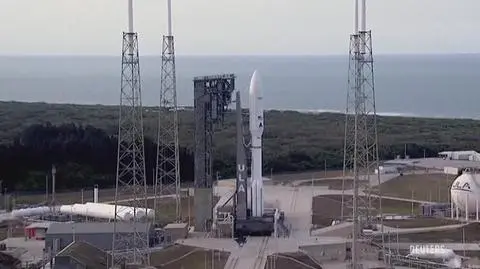Source: Piotr Sztefek/Facts in the afternoon of TVN24
Kosmos 482, i.e. a Soviet space probe, which according to preliminary forecasts was to enter the atmosphere over the territory of Poland, eventually bypassed our country. The Russians reported that its parts fell into the Indian Ocean.
For over half a century, a damaged probe called Kosmos 482 gradually orbited closer to the earth, so its fall was inevitable.
– Let's remember that this object circled very quickly over our planet, within one and a half hour flying around the earth – indicates Karol Wójcicki, astronomy popularizer and author of the blog “With a head in the stars”.
Even before the weekend there were a lot of fears that it would fall in Poland. It did not happen. After 11 o'clock, the Polish Space Agency issued a message in which we read that “there are no signals that the object can enter the atmosphere of land over Poland.”
So the threat was, but small. – The risk of falling on the territory of the Republic of Poland was not zero, but there was no particularly large – says Karol Wójcicki.
Chance of one to tens of thousands
– The risk that it falls on a head or a building is very low. Experts estimate that this is at the level of one to tens of thousands – indicates Hubert Kijek, TVN24 BIS journalist and author of the program “Kijek in Space”.
Kosmos 482 was built as part of the Venera program, which aims to explore Venus. The Soviet Union's probe fired on March 31, 1972. It was to fly towards the second planet from the sun and land on its surface. It failed. The probe never left the low Earth's orbit.
– There was no timer on the engine that was about to introduce this sampler to the orbit leading towards Venus. And he stayed in such an exotic orbit on the parameters of about 250 kilometers closest to the Earth and almost 10,000 kilometers the furthest – says Jarosław Juszkiewicz from the Silesian Planetarium, author of the book “Kosmos. I designate a new route”.
– This vehicle was a bit of such a ghost ship, circulating somewhere in the clouds of space – says Hubert Kijek.
It was anticipated that the probe would survive the earthly atmosphere again. It was built to withstand the flight through a carbon dioxide atmosphere of Venus. This gave birth to a threat.
– Everyone was afraid that he would fall to the ground and would make a lot of confusion, because it would be. We are talking about a mass of over 300 kilos accelerated to a speed of over 250 kilometers per hour, so a lot of energy – says Jarosław Juszkiewicz.
“Sometimes there are accidents”
How high is the risk that some object in the future will simply fall from space? – A dozen or so years ago, the likelihood of hitting on the street Kosmiczny Garbage was many times smaller than suffering from death in a plane crash – indicates Jarosław Juszkiewicz.
But that has changed. – We send more and more things into space. For example, we have a Chinese space program, which in recent years was, among others, its space station. It was in an uncontrolled way that parts of these vehicles returned to the ground – indicates Hubert Kijek.
The last flight of the Kosmos 482 probe over European sensors took place at 08:04. Another flight over Europe was expected around 09:50, but the probe was no longer registered, which suggests its entry into the atmosphere of the earth. Information about the deorbitation of the probe is confirmed by Russian sources. According to Interfax, citing Roskosmos, the probe flew into the atmosphere at 9:24 Moscow time. It was 8:24 in Poland at the time. – Orbit could indicate this. This probe in the morning flew over Poland, was noticed by a radar station, probably German, and then this orbit led at the Indian Ocean, so it is likely – says Jarosław Juszkiewicz.

Source: Reuters
Atmospheric properties make it difficult to forecast
Experts emphasize that it was not possible to predict where the probe would fall specifically. – The atmosphere varies very different. Sometimes it is more dense, sometimes less. Such probes flying close to Earth sometimes encounter more resistance in some areas of the atmosphere, and in others a little smaller, which is why we cannot predict it – explains Karol Wójcicki. That is why it is worth emphasizing it once again. The risk that something falls from space is small.
– We rub not only on earth, but also in space, we send various types of rockets, and sometimes there are accidents, as, for example, it was on the occasion of the Falcon 9 rocket – indicates Hubert Kijek.
We would like to remind you that on February 9 in an uncontrolled way in the atmosphere entered the Polish Falcon 9 Rocket Company. Spacex. Only that day in a few places in Greater Poland was found the first three objects that could be fragments of a rocket. The last fragments were found at the end of March. As a result of the lack of relevant warnings, the president was lost by the president of the Polish Space Agency.
The case of the fall of part of the Falcon 9 rocket was examined by the prosecutor's office. After the findings, she decided to discontinue the case. According to investigators, there was no crime.
Author/author: Piotr Sztefek
Source: Facts in the afternoon tvn24
Source of the main photo: ESA/DAVID DUCROSS
